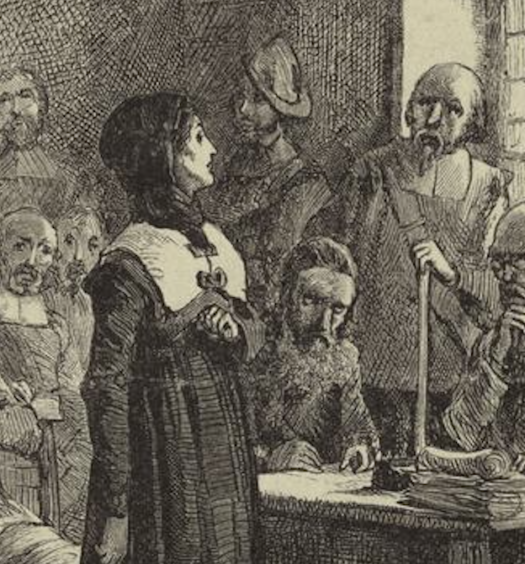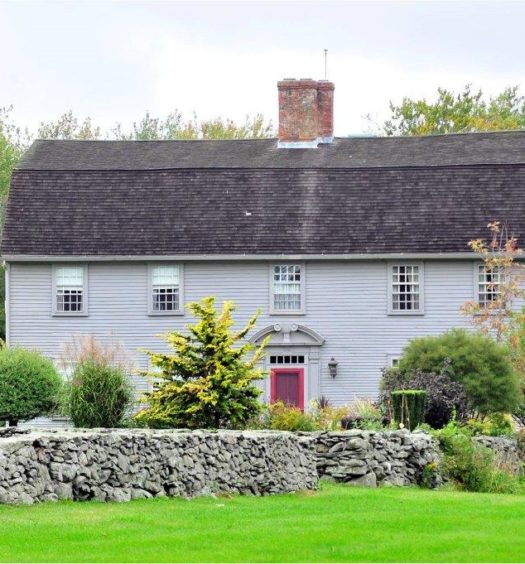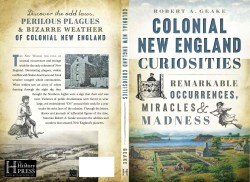The early court system of Providence was established in its first code of law in 1640, with a body of “five desposers” to ”meete upon gennerall ocations” and look after those instances where “any person abuse another in person or goods” By the year 1648, another decree was recorded in its “Book of Brass Clasps,” entitled “The Progress in Law,” its first tenet being that “All actions and cases shall be tried by six townsmen in the nature of a jury, yet with the liberty of not being put on swearing; and these six men to be picked by the town quarterly, and warned three days before the court, by the Sergeant, to be ready at the day and hour appointed, under penalty of three shillings for their neglect.”[1]
In 1656, the body made the experience of self-governance even more implicit when they enacted a law declaring that “all the inhabitants, though not admitted freemen, were able to be elected to office” and liable for a fine if they refused to serve. As was customary for the times, the jury members could be white males only.
Jury duty, as we know it today, was a far more sobering assignment in early Providence. To be called to be among those six or twelve men chosen to decipher the facts and consider the case that should go before the General Court and its Assistants, meant that an individual was summoned to investigate any violent assault, robbery, or death within the community. Escorted by the sheriff and one or more assistants, the men were taken to the scene of the accident or crime. Evidence obtained by the sheriff was viewed, as was the scene itself. Interviews with witnesses were conducted that day whenever possible, and one member of the group was chosen to record the testimonies and views of the twelve jurors about the case.
One of the first inquests recorded in Providence was the suspected robbery of Widow Sayers. The suspect was Wesuontup, a Native American of Masshepaug. According to the indictment, Wesuontop had “felloniously made an escape from the hands of his Keepers” some months before, and that on the night of April 18, 1649 at about midnight “he did feloniously break into the house of Widdow Sayers and took out thence severall goods &c.”
The suspect pled not guilty, and on June 19, those Assistants serving the town at that time—Thomas Harris, Robert Williams, Thomas Olney, and Jonathan Greene—as well as the interpreter Christopher Hawkshurst, presented their findings to the General Court after interviewing witnesses and informants.
During their first “Examination” of Wesuontup, he told the men that “he came from Massaapauoge with another Indian called Nanheggen yesternight into this Towne, and that he came to work with Mr. Scotte. “The witness continued, “he with the said Nanheggen lay that night on the other side of the River, …That the said Nanheggen tooke a Lader from Nic: powers house, to goe in, at a hole of Widdow Sayers house. That the said Nanheggen went in…and did put out of the said house, at the said hole, a Coat of skine, and three loaves of bread.” [2]
Nanheggen had only then opened the door for Wesuntop and sent him inside to “fetch fire, to take a pipe of tobacco.” After some prodding, the suspect indicated that another Native American named Paugaucuttucoe could vouch for him.
Upon being interviewed, the named corroborator told an inconsistent story. He informed the Assistants that he had “come to this Towne last night alone, for Wesuntupe, to helpe him lance a Cannow, but he could not find him.” The interpreter, Christopher Hawkhurst, also testified that Paugucuttucoe “came the last night unto Roger Williams house to inquire for the said Wesountup, but he was not there . . . .”
Nanheggen was brought before the Assistants the same day “upon o foresaid hue & Cry” to give his answer to Wesuntop’s charges. He told the men with scorn that “he came yeaterday about the Sun two houres past mid day, unto William Carpenter’s house at Pawtuxite, and fro’ thence he went unto Paswonquitte with Saconocitts sonne and there he st[ayed]. all night. That he did not see Wesuntop as he thinckes these 20 days but whereabouts being at worke at J. Coles . . . .”
Nanheggan even told the men that he had wanted to offer Wesuntop “wompum to worke” at Mr. Coles, but the farmer would not have him, “because he had the name of a thief.” Nanheggen insisted that he had not seen him since that time and further asserted that as “for Robery he neither knewe nor heard of it.”
Placed together for Examination “face to face,” Wesuntop “charged unto the face of Nanheggen all the particulars of his foresaid charge.” Nanheggen “replyed O’ Base, with nothing else material to cleare the Charge.”
The determination of the “Examinents” was to continue to hold Wesuntop and to commit Nanheggen as well “unto the safe custody of Towne Seargent Hugh Bewitt.” [3]
The town then ordered that those selected to be jurors were to “be warne upon service for the Tryall of these Indians Committed . . . . ”
Nicholas Power, Matthew Waller, William Hawkings, Nathanial Dixking, Thomas Clements, and James Aston were chosen to serve on the jury. The town further appointed William Field, William Wickenden, Joseph Field, Richard Waterman, Thomas Angell, and Thomas Hopkins to serve as well. This case served largely to entice the town to compose a set of laws dealing with “strangers.” Just a few years later, it was ordained that “it shall be lawful for any stranger “ to be arrested by “any person or persons when they can apprehend him, and that they shall be tried in the Towne where they are arrested. . . .”
Ultimately, Nanhiggen was convicted of theft by the jury and was sentenced to be bound as an indentured servant to John Downing of Providence. [4]
Other inquiries came when any death occurred in Providence. One of the earliest was upon the death of the unfortunate Margaret Goodwin, whom jurors determined on March 4, 1657, was killed either by the “terribleness of the crack of thunder on the second of the third month or the cold, being she was naked.” Goodwin had seen her property impounded by the city in the time of “her distraction” after the death of her husband six years before, and she remained impoverished the remainder of her days.
On August 15, 1679, a jury to serve as a “coroners inquest” was summoned to the home of Ephraim and Hannah Pearce in order to investigate the death of their daughter, Elizabeth. Neighbor Mehitteble Sprague testified that “upon ocation [occasion] of being . . . at the house of Ephraim pearce, and goeing home from thence homeward a little before the setting of the sun, hearing a sudden nooyse, looked about, and Saw Hannah pearce ye wife of Ephraim Run doune [down] the Hill to ye well and there pulled out Elizabeth . . . .”
The witness returned at once to the house where she found that Hannah “had layd her sayd Daughter on ye Bedd, where this deponant sayeth to ye best of her understanding she found sayd Elizabeth pearce . . . aged about one yeare and a halfe to be Absolutly Dedd . . . . sayd mother of ye sayd Childe did use what meanes they could to preserve life; but it Could not be for ye Childe as aforesd was Dedd . . . . “ Hannah Pearce testified that Elizabeth had gone out of the house with her elder sister, and that she could hear the children talking outside, but that about half an hour later the elder sister returned without her. Hannah “then asked the sayd Childe where is your sister, she Answered, shee is gone doune [down] that way (which way led to ye well, and pond) . . . .” Assistant John Whipple recorded that “wee find that Eliazabeth Pearce the Daughter of Ephraim and Hanah his wife . . . Exadentally [accidentally] fell into the well, and was overwhelmed in water, and by the providence of God drownded . . . .” [5]
Investigating childhood fatalities would become all too commonplace, such as when a jury was sent to investigate the sudden death of the young son of Lieutenant James Olney and his wife Halelujah, which they determined was “a natural death.” In another case twelve men were sent to the scene of a sudden death on the farm of Josiah Owen in late December of 1723; where Owen’s son “was found dead this present day. It was determined that “the verdict of this jury is that said Josiah Owen was killed accidentally by meanes of Josiah Owen Senior his carte whele running over his head.”
In December of 1708, the General Court heard the verdict of a jury regarding “a true and due inquest upon ye body of William Carpenter.” Carpenter was a member of one of the founding families of Providence. The thirteen member jury, which included Israel Arnold, Benjamin Carpenter, and Nathanial Waterman Jr., found that “upon ye 29th of October the sd William Carpenter in endeavoring to goe over ye river a little above Pawtuxett Falls was by casualty or accident driven downe the Falls by which he was Dashed, Bruised, and Drownded; & so he came by his death.” [6]
Jurors were also sent to serve in the General Court and among the documents of early Providence are notices summoning the assigned jurors to courts in Portsmouth and Newport. For example, one summons stated: “By virtue of a warante; Received from the Presidente to this purpose: this is to will & require you; in his Maijesties name….to choose out of your free inhabittantes soe many: just; able; & honest men; of good reports; as may serve the grand inquest accordinge to law.”
While towns were required to choose and send jurors to the General Court’s proceedings held by designation of the General Assembly in Providence, Warwick, Newport, or Portsmouth, whether those jurors arrived for their assignments was another matter, despite the fines imposed for their failure to appear. At least part of the problem stemmed from the timing of the Courts, initially held in May at the height of planting season, and again in October, when many were home gathering the harvest. Those chosen for jury duty were men of substantial means and modest means. Most inhabitants were tied directly to agriculture, either on self-sustaining farms, or with the trade and transport of such goods as well as livestock and their byproducts. It was a problem that Governor William Brenton brought to the attention of the General Assembly in August of 1668: “This year there hath been many matters of publique Concern . . . which required ye calling of a General Assembly, but knowing ye in hay & harvest time, it would not bee pleasing unto you to bee taken off from your needful imploy att such a time, & Considering ye Court is by order of ye Charter to meet in October next . . . Ye Council having mett and taken it into serious consideration, ye Major part did judge, a Gen. Assembly would hardly bee quietly Convened . . . . ”
Despite the Governor’s suggestion that the Court meet earlier than appointed by the Charter, the law remained fixed, and the Court of Trials was held in Newport on October 21st. William Hawkins, John Smith, John Steere, and Joseph Williams of Providence were fined “twenty shillings apiece” for their failure to appear, as was Thomas Lawton of Portsmouth. Two others from that town, Thomas Cornell and Francis Brayton, were fined ten shillings for their non-attendance. The following year, the town of Warwick itself was fined “fortye shillings to the publicke Tresury for not observing the Law” when the two men assigned to jury duty, including the Constable Job Almy, failed to appear.
The problem would persist in the colony until 1721, when the General Court of Trials was replaced by county courts, and jurors no longer had to travel beyond their community to serve their time. This is a preference that still resonates today with many of Rhode Island’s citizens.
[This article derives from a chapter in Robert A. Geake’s latest book, Colonial New England Curiosities (History Press, 2014) [Banner Image: Providence in the early stages of development in the mid-sixteenth century (Roger Williams National Memorial)]Footnotes
[1] Rhode Island Colonial Records, Vol. 1. p. 113. [2] Field, Edward, ed., Early Records of the Town of Providence, Vol. VIII (Providence, Providence City Council, 1889), p. 26-28 [3] Staples, William R., ed., Annals of the Town of Providence (Providence: Knowles and Vose, 1843). According to Staples, up until 1840, the longest serving Sergeant in Providence was James Hammond, who resigned from the office in 1830 after serving for twenty-one years. He died less than a year later at the age of eighty-one. [4] Newell, Margaret Ellen, Brethren by Nature (Cornell University Press 2015), pp.222-223. [5] Staples, ed., Annals of the Town of Providence, 195 and 196. [6] Field, Edward, ed., Early Records of the Town of Providence, Vol. V (Providence, Providence City Council, 1889), pp. 253-254.

















